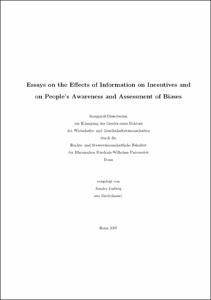Essays on the Effects of Information on Incentives and on People’s Awareness and Assessment of Biases

Essays on the Effects of Information on Incentives and on People’s Awareness and Assessment of Biases

| dc.contributor.advisor | Shaked, Avner | |
| dc.contributor.author | Ludwig, Sandra | |
| dc.date.accessioned | 2020-04-09T10:50:25Z | |
| dc.date.available | 2020-04-09T10:50:25Z | |
| dc.date.issued | 2007 | |
| dc.identifier.uri | https://hdl.handle.net/20.500.11811/2772 | |
| dc.description.abstract | The first two essays deal with the interaction between intermediate information and incentives when information asymmetries are present. While in the first essay, individuals’ types can be private information, in the second essay, moral hazard is an issue. In both essays, intermediate information arises endogenously through a change in the timing structure when individuals act sequentially instead of simultaneously. The first essay, considers contests in which two players compete for an exogenously given prize. The essay compares contests, in which players either move simultaneously or sequentially, under different information settings: Contestants' types are either publicly known or private information. In case agents act sequentially, the second mover can observe the action of the first mover. In sequential contests, overall incentives turn out to be higher (from an ex ante perspective), not only under public information (which is already known) but also under private information. Moreover, in sequential contests, incentives rise (from an ex ante perspective), when there is private information compared to public information. The second essay investigates a model of team production under moral hazard, focussing on incentive effects of intermediate information, which arises when agents act sequentially instead of simultaneously. In case agents act sequentially, the second mover can observe the performance of the first mover. Irrespective of the timing structure, the principal can condition wages only on the value of the agents’ joint project. The optimal structure for the principal depends on whether the agents' tasks are complements or substitutes: A sequential structure is optimal when the agents' tasks are perfect complements, whereas a simultaneous structure is optimal when they are perfect substitutes. Extending existing models, this essay introduces task complementarities and an intermediate value of the joint project. In this extended setting, intermediate information does not necessarily increases incentives. The last essay deals with the question how accurate people’s beliefs about other people’s beliefs are. The issue how accurate people’s beliefs are about their own abilities is considered in experiments on overconfidence. This essay goes one step further and elicits beliefs people have about the accuracy of other people’s beliefs. The essay experimentally analyzes (i) whether individuals are aware of other people's bias - over- or underconfidence - and (ii) what they believe about the relation between their own and other people's bias. More precisely, it considers people's self-assessment about their number of correct answers when answering a set of multiple choice questions. The results confirm that people tend to overestimate their ability, i.e. the population on average is biased. Remarkably, most people do not think that others have a bias. The more familiar the subjects are with the question task before they evaluate others’ self-assessment - e.g. they solved the questions themselves and assessed their number of correct answers or have seen the correct answers - the more accurate their evaluation is. Further, concerning people’s belief about the relation of their own and others’ biases, people think that they are rather unbiased themselves, while others are biased. | en |
| dc.language.iso | eng | |
| dc.rights | In Copyright | |
| dc.rights.uri | http://rightsstatements.org/vocab/InC/1.0/ | |
| dc.subject | sequentielle Turniere | |
| dc.subject | Zwischeninformation | |
| dc.subject | asymmetrische Information | |
| dc.subject | Teams | |
| dc.subject | Experiment | |
| dc.subject.ddc | 330 Wirtschaft | |
| dc.title | Essays on the Effects of Information on Incentives and on People’s Awareness and Assessment of Biases | |
| dc.type | Dissertation oder Habilitation | |
| dc.publisher.name | Universitäts- und Landesbibliothek Bonn | |
| dc.publisher.location | Bonn | |
| dc.rights.accessRights | openAccess | |
| dc.identifier.urn | https://nbn-resolving.org/urn:nbn:de:hbz:5-10473 | |
| ulbbn.pubtype | Erstveröffentlichung | |
| ulbbnediss.affiliation.name | Rheinische Friedrich-Wilhelms-Universität Bonn | |
| ulbbnediss.affiliation.location | Bonn | |
| ulbbnediss.thesis.level | Dissertation | |
| ulbbnediss.dissID | 1047 | |
| ulbbnediss.date.accepted | 13.04.2007 | |
| ulbbnediss.fakultaet | Rechts- und Staatswissenschaftliche Fakultät | |
| dc.contributor.coReferee | Heidhues, Paul |
Dateien zu dieser Ressource
Das Dokument erscheint in:
-
E-Dissertationen (288)




